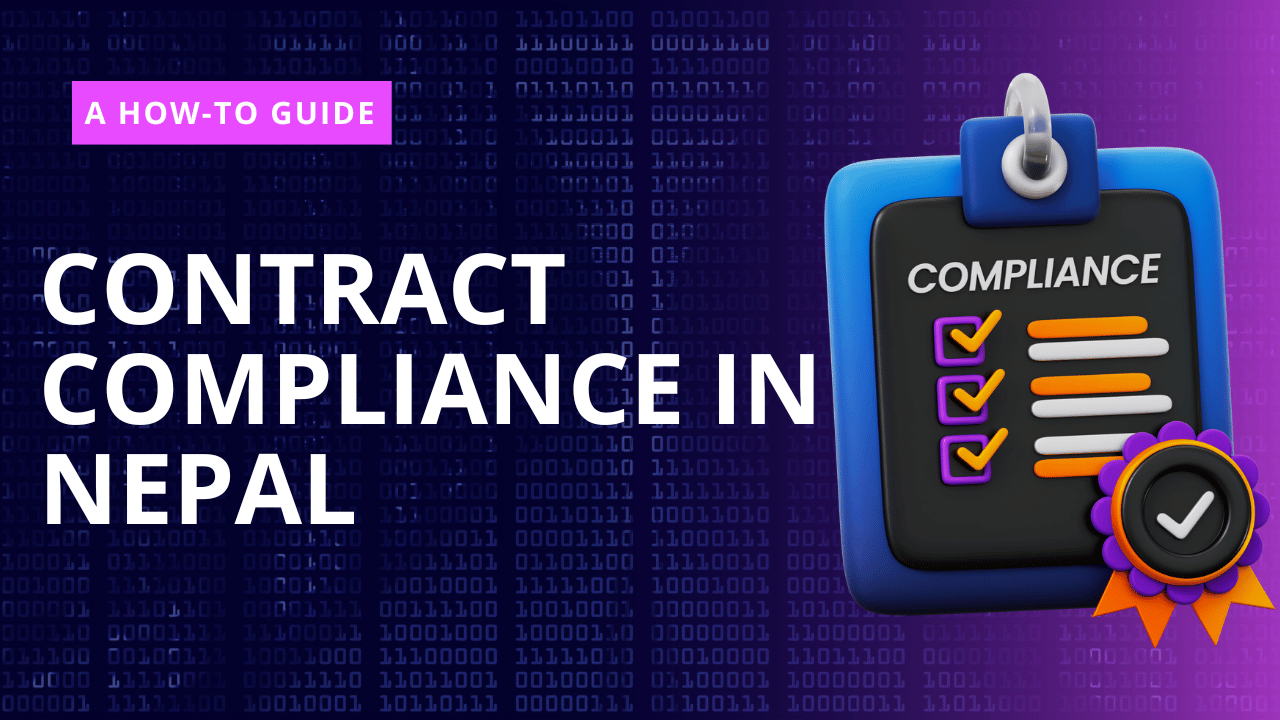
What is company compliance in Nepal?
Company compliance in Nepal refers to adhering to the legal and regulatory frameworks established by the government. This ensures businesses operate ethically and transparently. Here’s a basic breakdown:
- Registration: Following proper procedures to register your company type (private, public, etc.) with the Office of the Company Registrar (OCR).
- Tax Filings: Regularly filing tax returns and paying applicable taxes to the Inland Revenue Department (IRD).
- Record Keeping: Maintaining accurate financial records and company documents as per regulations.
- Meetings and Filings: Holding annual general meetings and submitting annual reports to the OCR.
- Reporting Changes: Notifying the OCR of any significant changes within the company, like directors, shareholders, or capital.
Why is company compliance important?
Company compliance in Nepal is crucial for several reasons:
- Legal Protection: Adherence to regulations safeguards your company from hefty fines, penalties, or even legal disputes. It ensures you operate within the legal boundaries set by the government.
- Enhanced Reputation: A compliant company builds trust with customers, partners, and investors. It demonstrates a commitment to ethical practices and responsible business conduct.
- Smooth Operations: Following regulations avoids unnecessary delays or disruptions due to non-compliance issues. This allows your company to focus on core operations and growth.
- Investor Confidence: Investors are more likely to be attracted to companies that demonstrate a strong compliance record. This can lead to better investment opportunities and access to capital.
- Fair Market Environment: Compliance fosters a level playing field for all businesses. It prevents unfair competition from companies that disregard regulations.
What are the regulatory bodies overseeing company compliance in Nepal?
In Nepal, several regulatory bodies oversee company compliance, each focusing on different aspects:
- Office of the Company Registrar (OCR): Handles company registration, filings (annual returns, changes in directors, etc.), and ensures adherence to company law.
- Inland Revenue Department (IRD): Responsible for tax administration, including issuing PAN cards, collecting taxes from companies, and ensuring compliance with tax regulations.
- Securities Board of Nepal (SBN): Oversees the securities market, regulates public companies, and ensures investor protection for companies listed on the Nepal Stock Exchange (NEPSE).
- Department of Industry (DoI): Might require approval for registering certain types of businesses depending on the industry and potential impact.
- Other Sector-Specific Regulators: Specific industries like banking or insurance might have additional regulatory bodies overseeing their activities and ensuring compliance with industry-specific regulations.
How do companies ensure compliance with Nepali laws?
Businesses guarantee adherence to Nepali laws by following guidelines established by different regulatory organizations. They have to follow tax laws by registering with the Inland Revenue Department (IRD), receive required licenses, and register with the Office of Company Registrar (OCR). Businesses follow industry-specific norms, environmental regulations, and labor legislation. Internal reviews and audits on a regular basis support compliance. Using compliance officers and legal counsel guarantees that you are aware of any changes to the law. Companies also put policies and training programs in place to inform staff members about compliance obligations, which helps to cultivate a culture of compliance with Nepali laws and regulations.
What are the penalties for non-compliance?
In Nepal, non-compliance with company regulations can lead to a range of penalties, depending on the severity and nature of the offense. Here’s a breakdown of some potential consequences:
- Fines: Monetary penalties are the most common consequence, varying in amount based on the specific regulation breached. These can be imposed by the Office of Company Registrar (OCR) or the Inland Revenue Department (IRD).
- Late Filing Penalties: Failing to submit annual reports or tax returns on time typically incurs late filing fees that increase with further delays.
- Denial of Services: Non-compliant companies might be denied access to certain services, such as opening bank accounts, applying for government licenses, or participating in tenders.
- Public Notice and Blacklisting: In severe cases, the company’s non-compliance details can be publicly announced, potentially damaging its reputation. Repeated offenses might lead to blacklisting, hindering future business operations.
- Personal Liability of Directors: In extreme cases, company directors can be held personally liable for financial penalties or even face legal action resulting from non-compliance.
Can companies outsource compliance management?
Yes, companies in Nepal can outsource compliance management to a certain extent.
Partial Outsourcing Common: While full outsourcing of core compliance responsibilities might not be advisable, companies often outsource specific compliance tasks.
- Benefits of Outsourcing:
- Expertise: Compliance specialists can stay updated on complex regulations and ensure proper procedures are followed, potentially minimizing risks of non-compliance.
- Time Efficiency: Outsourcing frees up internal resources to focus on core business activities.
- Cost-Effectiveness: For smaller companies, outsourcing specific tasks can be more cost-effective than hiring a dedicated full-time compliance officer.
What documents are required for company compliance in Nepal?
The documents required for company compliance in Nepal can vary depending on the specific company type, industry, and the stage of compliance (registration vs. ongoing). Key documents:
- Registration Documents:
- Company registration application form
- Memorandum of Association (MOA) outlining company objectives and capital structure
- Articles of Association (AOA) detailing internal governance rules and procedures
- Citizenship certificates or passports of shareholders and directors
- Any other documents specific to your chosen company type (e.g., foreign investment approval for foreign-owned companies)
- Annual Compliance Documents:
- Minutes of Annual General Meeting (AGM)
- Audited financial statements (may not be required for all companies)
- Annual reports with details of directors, shareholders, and significant events during the year
- Tax filings and payment receipts (income tax, VAT, etc.)
- Records of changes in company information (e.g., new directors, address change)
- Appointment of a company secretary (optional, but recommended for some companies)
How often do companies need to report compliance?
The frequency of compliance reporting for companies in Nepal depends on the type of company and the specific regulations they fall under:
- Annual Reports: Most companies, private or public, need to file annual reports with the Office of the Company Registrar (OCR) within a specific timeframe (often within 3 months of the Annual General Meeting). These reports typically include financial statements, shareholder information, and details of significant events during the year.
- Tax Filings: Companies are subject to various taxes in Nepal, and the filing frequency depends on the specific tax type. Income tax returns might be filed annually, while Value Added Tax (VAT) might require more frequent filings (e.g., quarterly). The Inland Revenue Department (IRD) sets deadlines for these filings.
- Public Company Disclosures: Public companies listed on the Nepal Stock Exchange (NEPSE) have stricter reporting requirements. They might need to submit quarterly or even more frequent financial reports and disclosures to ensure market transparency.
- Other Regulatory Filings: Depending on the industry and specific regulatory bodies involved, companies might need to submit additional reports or compliance documents periodically. These could be related to environmental permits, labor regulations, or specific industry standards.
Are there industry-specific compliance requirements?
Yes, on top of general company compliance requirements in Nepal, there are often industry-specific regulations businesses must follow. Here’s the gist:
- Sectoral Regulations: Certain industries like banking, healthcare, or environmental sectors have additional regulations beyond the general company act. These might involve specific licenses, permits, or reporting requirements.
- Regulatory Bodies: Industry-specific regulatory bodies might oversee specific sectors and enforce their regulations. For example, the Nepal Rastra Bank regulates the banking sector.
- Compliance Impact: Meeting these industry-specific requirements can impact areas like product safety standards, environmental practices, or consumer protection measures depending on the sector.
How does compliance differ for private and public companies?
Compliance for public companies in Nepal is stricter. They face more regulations regarding reporting, auditing, and corporate governance compared to private companies.
Can companies receive assistance for compliance?
Absolutely, companies in Nepal can access various types of assistance for navigating compliance requirements. Here are some options:
- Lawyers: Law firms specializing in corporate law can advise on company registration, ongoing compliance obligations, and help navigate complex regulations.
- Chartered Accountants: Accountants can assist with bookkeeping, financial statement preparation, tax filings, and ensuring adherence to accounting standards.
- Company Secretaries: While not mandatory for smaller companies, company secretaries can help maintain corporate governance practices, ensure proper filing of documents, and keep track of meeting requirements.
- Consultancy Firms: Business consultancies might offer compliance services, including helping develop compliance plans, conducting audits, and providing training for company personnel on relevant regulations.
- Government Resources: The websites of regulatory bodies like the Office of the Company Registrar (OCR) or the Inland Revenue Department (IRD) often provide resources and guidance on compliance procedures.
What is the role of internal audits in compliance?
Internal audits play a vital role in ensuring a company’s compliance with regulations in Nepal. Here’s how they contribute:
- Risk Assessment and Detection: Internal audits evaluate a company’s internal controls and identify areas where weaknesses or potential non-compliance risks might exist. This proactive approach helps prevent issues before they escalate.
- Verifying Accuracy of Records: Internal auditors review financial statements, accounting practices, and other company records to ensure they are accurate and reflect the company’s true financial position. This helps maintain transparency and reduce the risk of errors or fraudulent activities that could violate regulations.
- Testing Controls: Internal audits test the effectiveness of the company’s internal controls designed to ensure compliance with regulations. This includes controls over areas like financial reporting, procurement, and asset management.
- Promoting Good Governance: A robust internal audit function fosters good corporate governance by promoting ethical practices and adherence to relevant laws and regulations. This builds trust with stakeholders, including regulators and investors.
- Recommendations for Improvement: Internal audits identify areas where the company’s processes or controls can be improved to strengthen compliance. Their recommendations can help management address weaknesses and minimize the risk of non-compliance.
- Supporting External Audits: Internal audits can provide valuable insights and working papers for external auditors, streamlining the external audit process and ensuring a more comprehensive review of the company’s financial health and compliance posture.
How do companies stay updated on regulatory changes?
Companies in Nepal can stay updated on regulatory changes through several methods:
- Government Websites:
- Office of the Company Registrar (OCR): https://nepaltradeportal.gov.np/ publishes updates on company registration regulations and procedures.
- Inland Revenue Department (IRD): https://ird.gov.np/ announces changes in tax laws, filing requirements, and deadlines.
- Ministry of Law, Justice and Parliamentary Affairs: https://www.moljpa.gov.np/ provides updates on legislative changes that might impact businesses.
- Business Associations and Chambers of Commerce:
- These organizations often send out newsletters or host seminars informing members about new regulations and their implications. Examples include the Federation of Nepalese Chambers of Commerce and Industry (FNCCI) or industry-specific associations.
- Legal and Accounting Firms:
- Subscribing to legal or accounting newsletters from reputable firms in Nepal can provide valuable insights on regulatory changes that might affect your company.
- News Media:
- Following business news publications or online news sources can keep you informed about major regulatory announcements.
- Professional Networking:
- Connecting with other business professionals in your industry allows you to share information and stay updated on industry-specific regulatory developments
Conclusion
Ensuring company compliance in Nepal is essential for businesses to operate legally and efficiently. By adhering to the laws and regulations set forth by the Companies Act, 2006, and other relevant legislations, companies can build trust, avoid penalties, and foster sustainable growth. Regular compliance with financial reporting, tax obligations, and regulatory requirements is not just a legal necessity but also a crucial step towards maintaining credibility with stakeholders. Properly understanding and implementing compliance practices empowers businesses to contribute positively to Nepal’s economic development while safeguarding their operations from legal and reputational risks.







